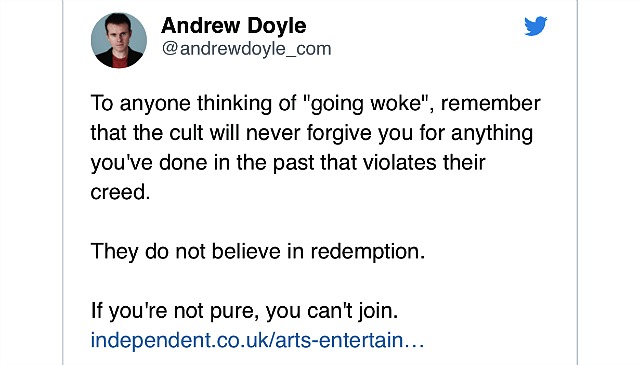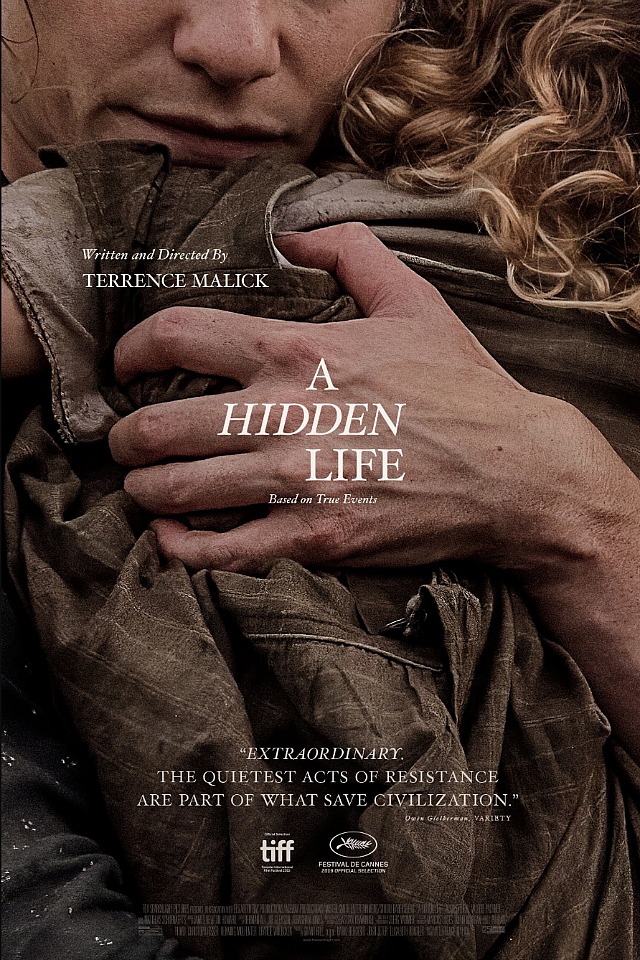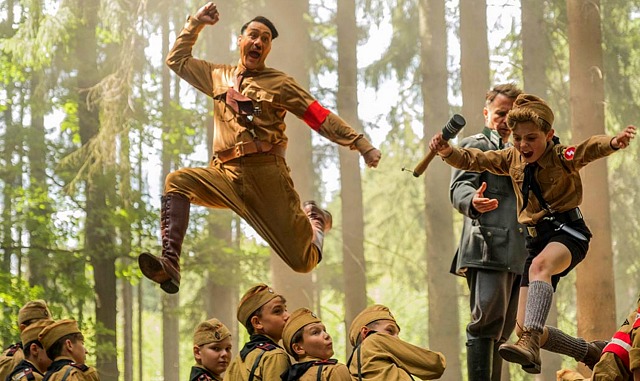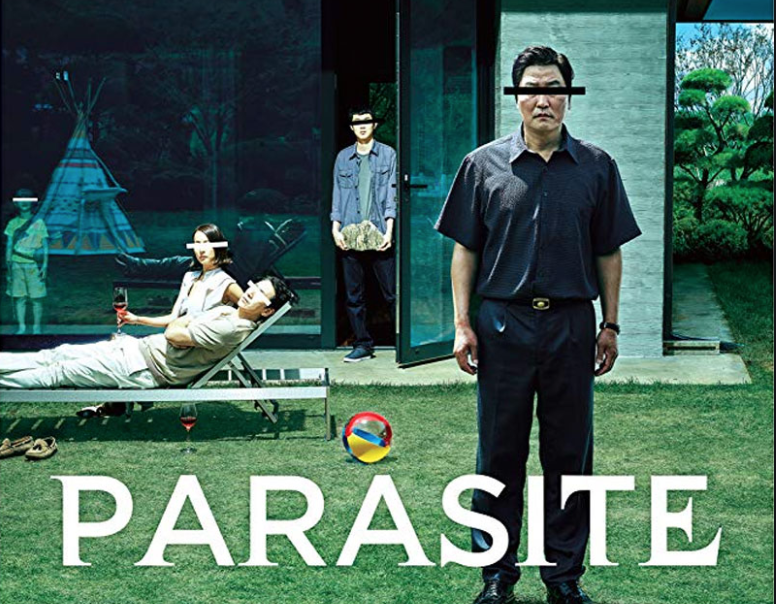[7:25] Anderson Cooper: “Isn’t the Republican party now Trump’s?” Anthony Scaramucci: “No, no…it’s like I told John Berman. It’s like the green witch.” [Note: Mooch is referring to Margaret Hamilton’s Wicked Witch of the West in The Wizard of Oz.] “Once you throw the water on the green witch and she starts melting, those gray soldiers said ‘hey, Dorothy, we’re sorry about this. We were behind the green witch because of the perception of her power…okay?’ If [Republicans] come to him as a unit…they know I’m right, they know I’m right. They’re just afraid to say it because they don’t want to get primary-ed, they don’t want to get Trump twitter lit up, like the big cyber bully that he is.”
 Jeffrey Wells
Jeffrey Wells
By My Sights…
…as close to perfect as a gently erotic, deeply passionate period drama could be. Simultaneously restrained and highly charged, and intensely performed by Noemie Merlant (as a portraitist) and Adele Haenel (as a young woman reluctant to be married off, presumably for reasons of orientation).
Director Celine Sciamma‘s minimalist approach delivers the right tone, touch and emphasis, and I mean precisely.
Any film that re-ignites your (possibly) dormant love of Vivaldi’s “Four Seasons” as a climactic send-off is doing something right.
Wiki boilerplate: At the end of the eighteenth century Marianne (Merlant), a young painter, is commissioned to paint a portrait of a young woman to be used to elicit marriage proposals. Knowing that the woman, Heloïse (Haenel), has previously refused to sit for portraits as she does not want to be married, Marianne disguises herself as a lady’s maid in order to gain her subject’s trust only to find herself inadvertently falling in love with her.”
Wiki subtext: “In 2014 Haenel revealed she was in a romantic relationship with Sciamma, whom she met on the set of Water Lilies by publicly acknowledging their relationship in her acceptance speech for her César award in 2014. As of 2018 she was in a relationship with singer Julia Lanoe.”
Least Problematic Bong Joon-ho
Before Parasite, I’d seen four films by respected Korean director Bong Joon-ho — The Host (’06), Mother (’09), Snowpiercer (’13) and Okja (’17). My reactions were the same all along — I admired the craft and energy, didn’t believe the stories. To me it seemed obvious that Bong was more into high impact movie-ness than establishing at least a tenuous relationship between his scenarios and the terms and conditions of real life.
The darkly humorous Parasite, which I saw three weeks ago, is different. For the first time Bong allows you to half-invest in the story (co-written by himself and Han Jin-won), which offers a satiric portrait of South Korea’s haves and have-nots. Up to a point, the world of Parasite actually resembles the way things are, or at least could be. But it still feels more movie-ish than persuasive.
There’s no believing that the desperately poor Kim family (mom, dad, son, daughter), each having wangled jobs from the rich Park clan, could successfully pretend over the long run to be non-related strangers in the eyes of their employers. It’s completely reckless and stupid for the Kims to gorge on fine food and get drunk while the Parks are away on on a brief vacation, and it makes no sense to admit a resentful former employee into the home while they’re bombed. And the violent ending is absurd. But I liked it better than the previous four Bong flicks, and that’s not insignificant.
U.S. and British critics have been creaming over Bong Joon-ho films since The Host. They’re invested in this history, and will never modify their enthusiasm. All this trailer does is pass along the ecstatic Cannes reviews.
Silverman Heroically Stands Up To Cancel Culture
“Cancel culture”, which has been calling the shots for the last two or three years, is basically about a consensus view among p.c. progressives that ruining careers of this or that sexist abuser or criminal will send the strongest message to other potential abusers to stop and desist. Younger progressive women are understandably the main believers and drivers. Certain abusers obviously deserve cancelling, others are or were more deserving of temporary ostracism (Aziz Ansari), and a third group arguably doesn’t deserve to be on anyone’s hit list at all.
I’ve heard and read that “cancel culture” would love to deepsix Bill Maher, to mention one example, but they don’t have the horses.
As HE readers know, cancel culture deep-sixed my Sundance press pass late last year. I still covered Sundance ’19 by the good graces of my publicist pals, but it’s creepy nonetheless. I haven’t abused anyone — I’m just an opinionated bigmouth. Have I written five or six ill-advised or clumsily-phrased posts that I regret putting to pen? Yeah, but nothing I can’t mount a vigorous defense of if you wanna get into it. (Which I don’t at this point.) I’ve behaved like an asshole now and then, sure. The heaviest hits came from a couple of posts that surfaced a decade ago (partly due to an imbibing lifestyle I was leading at the time). I wish I could wipe it all away.

But these are zing blips on the screen compared to the torrents of material I’ve posted since the launch of HE in August ’04, not to mention the previous column material (Mr. Showbiz, Reel.com, Movie Poop Shoot) that I posted from ’98 to ’04. Not to mention my mainstream reportings in the bigtime ’90s and before.
Anyway, having actually felt the hot breath of the p.c. Stasi on the back of my neck, I damn near melted with love and gratitude when I read Sarah Silverman’s recent comments about cancel culture, as shared on an 8.8 Bill Simmons podcast.
Silverman: “I recently was going to do a movie, a sweet part, then at 11 pm the night before they fired me because they saw a picture of me in blackface from that episode. I didn’t fight it. They hired someone else who is wonderful but who has never stuck their neck out. It was so disheartening. It just made me real, real sad, because I really kind of devoted my life to making it right.”
However, Silverman said, cancel culture, which she has called “righteousness porn,” is “really scary and it’s a very odd thing that it’s invaded the left primarily and the right will mimic it.
You Still Haven’t Seen This? Seriously?
Roger Durling to David Crosby (1:04): “Then why do [this documentary]? You have nothing to prove. You’re successful”. Crosby to Durling: “It’s kinda like, okay…you’re alone in the house. And you know that you’re gonna die. You’re gonna die. All of you. It’s not something we talk about. Everybody’s uncomfortable with it, but you’re gonna. So let’s say you have an urge to clean your house. It’s kinda like that.”
HE Approved
.@JulianCastro bought ad space on FOX news to air this. WHAT KIND OF BOSS MOVE. pic.twitter.com/mPnYjTRiAs
— chris evans (@notcapnamerica) August 13, 2019
Perfectly Cut, Timed, Phased
Perhaps the most glorious aspect of Terrence Malick‘s A Hidden Life (Fox Searchlight, 12.13) is the truly wonderful eye-bath cinematography by Jörg Widmer, which more than lives up to Emmanuel Lubezski standards. The just-released trailer should be enough to convince even the most dire skeptic that the film is an absolute visual knockout.
Congrats to Mark Woollen of Mark Woollen & Associates for a truly exceptional trailer.
From HE’s 5.19.19 Cannes review: “Does A Hidden Life suggest there are strong similarities between Nazi suspicion of Jews and other races and the racial hate that Donald Trump has been spewing since at least ’15? Yeah, it does, and that’s a good thing to chew on.”

How Depressing Is This?
From “Fox Feels the Pressure From Disney as Film Flops Mount,” by Variety‘s Matt Donnelly and Brent Lang: Taika Watiti‘s Jojo Rabbit, allegedly a doo-wacky, doo-wacky wah-wah satire of Nazism, “might prove a little too edgy for Disney brass accustomed to producing movies suitable for parents and kids. Searchlight has started to screen the film for its new parent company. Halfway through one recent viewing one [Disney] executive grew audibly uncomfortable, worrying aloud that the material would alienate Disney fans. His unease may have been over the film’s cutting-edge satire, but it was also an expression of the culture clash taking place as the two studios embark on their new union.”
Producer friend: “Recently went over to Fox to hear David Greenbaum and Matthew Greenfield , the co-presidents of Fox Searchlight, speak about the future of the company. They ran a short film montage before of the studio’s 25 years of making award-winning films. An impressive presentation. They both stressed that Searchlight made iconic movies for a price and won awards in the process, which promotes healthy box office. They said we’re looking for the original idea, not the obvious formula, and cited The Shape of Water as the film about the mute girl who has sex with the fish man. They got a standing ovation.”

Latest TIFF/Telluride Calculations
Received from World of Reel’s Jordan Ruimy: “It seems as if Amazon Studios is taking The Aeronauts to Telluride and Toronto, and Fox Searchlight Pictures is taking Lucy in the Sky just to Toronto.
“But where’s Kelly Reichardt’s First Cow? Despite Venice boss Alberto Barbera stating that Cow was going to Telluride and Toronto, it was still not announced in today’s TIFF announcement containing the last wave of TIFF titles. Cow is definitely playing the New York Film Festival.
“Going to Telluride and Toronto are Trey Edward Schultz’ Waves and Michael Covino’s The Climb.
“Not going to Telluride: Hirokazu Kore-eda’s The Truth, Lucy in the Sky, Seberg, Olivier Assayas’ WASP Network, Mati Diop‘s Atlantics, Bacurau, Beanpole, Synonyms, About Endlessness.”
Screaming Spurt
Scarjo to Entertainment Tonight Canada: “I did a job with Adam Driver recently” — i.e., Marriage Story. “We spent two entire days screaming at each other, brutally screaming and fighting for two full days. It was exhausting, but if I didn’t have as strong an actor as Adam to take all the stuff I was giving him I would have been lost. For me, working with other actors is a really important part of what I do…it’s everything.”
Just two days? I thought Marriage Story was supposed to be some kind of acrimonious, full-throttle story of a bitter divorce. The Wiki page says it shot between 1.15.18 and continued until April 2018, or roughly 11 or 12 weeks. Which would be…what, 55 or 60 shooting days? Two screaming days out of 55 or 60? Noah Baumabch‘s film runs 136 minutes.
“Little Women” Re-Energized, Wokeness in 1860s
Greta Gerwig‘s Little Women (Sony, 12.25) is apparently…okay, obviously a Best Picture contender. The Gold Derby gang has been presuming this all along but here’s the first serious indication of same. Obviously and necessarily composed through the lens of contemporary woke-itude. Saoirse Ronan‘s performance as Jo will almost certainly result in a Best Actress nomination. Already adoring the rosey-amber tones in Yorick Le Saux‘s interior cinematography. I’ve been hearing all along that Florence Pugh delivers a striking supporting performance (she supposedly has a stand-out monologue moment) and is the strongest acting contender apart from Ronan. But the trailer cutters decided to focus on Saoirse, Timothee Chalamet and the Barry Lyndon-ish lensing.
Haven’t I Been Inferring This?
You could say that a good two-thirds or even three quarters of Goodfellas is about the perverse and wicked excitement of the gangster life. Earlier this month I wrote about having read portions of a ten-year-old draft of Steve Zallian‘s Irishman screenplay, and said it was “so spare and direct and absorbing, such a page-turner, so seemingly familiar with the behavior, rituals and language of 20th Century northeastern criminals.” The portions I read felt episodic in a Goodfellas-type way, although not as darkly thrilling, I suppose. I dsidn’t come upon any crazy Tommy stuff. It seemed to be “a melancholy summing-up of the whole Scorsese criminal culture exploration that began 46 years ago with Mean Streets…a fascinating assessment of what this kind of life amounts to, and what it costs in the end.”




